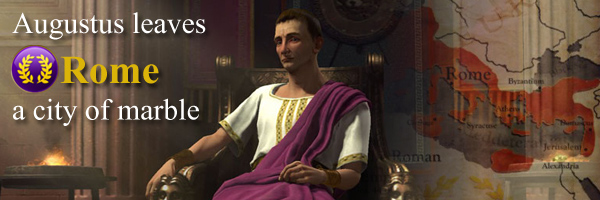
I've already covered strategies for the civilizations that have been added or explicitly changed in the Brave New World expansion and its major fall (2013) patch. Now I'm going to move on to other legacy civilizations that have not had explicit changes, but who may have had their strategies significantly altered by the expansions and other updates. This time, I will be covering one civ that surprisingly does not benefit from Brave New World's new mechanics as much as one might think: the Roman Empire.
Rome is one of the most influential and heavily romanticized cultures of the classical world. The early Roman republic was a system of semi-democratic representational government. Power was divided between two consuls who were annually elected by the citizens and alternated as military leaders to check each others' ambitions, while an appointed body of senators directed foreign policy and enacted laws. The city gradually expanded its power and influence in the second half of the first millennium BC through the overwhelming success of its legionary forces and defeat of its primary rival Carthage, until it eventually came to control almost the entire Mediterranean. Rome itself became the center of government and commerce for most of Europe, and it established an elaborate network of roads, aqueducts, and other engineering feats.
The Roman government was generally very tolerant of foreign religions and cultures, which helped to pacify subjugated peoples. But as Rome became an empire, and its holdings expanded, this tolerance became a liability. Foreign peoples were allowed admittance into the army in order to secure Rome's ever-increasing borders, which lead to a decline in loyalty to Rome as the army became more diverse and less centralized. Eventually, generals would begin competing with each other for control of Rome and the title of emperor, weakening the empire from within and making it vulnerable to external threats such as immigrating Germanic tribes displaced by the Huns. Eventually, these threats would culminate in the sacking of Rome by the Visigothic leader Alaric in August of 410 AD, and the collapse of the Western Roman Empire. However, the eastern half of the empire, also known as the Byzantine Empire, would continue to carry the torch of Rome for another thousand years.

After the death of Julius Caesar, his adopted nephew and heir, Gaius Octavius, along with Marc Antony and Marcus Lepidus, tracked down and defeated Brutus, Cassius, and the other assassins who had conspired against Caesar. This new triumvirate quickly disintigrated into civil war, with Octavius decisively defeating both Lepidus and then Antony and holding sole authority over a new Roman Empire. He changed his name to Caesar in honor of his adopted uncle, and reinstated the Roman senate as a puppet facade government to legitimize his dictatorial leadership. He was extremely popular among the Roman citizens due to his relation to Julius, and was eventually honored with the title Augustus. He instituted numerous domestic reform including official police and fire-fighting services, engineering projects such as roads, and expanded the dominion of Rome in Africa, Hispania, and Germania. Octavius found Rome a city of bricks; Augustus left it a city of marble, and the envy of the western world. [More]
d459e477-29a8-4c05-a582-9bfa0d6c216a|2|5.0
Tags:Sid Meier's Civilization, Civilization V: Brave New World, Civilization V, Rome, Augustus Caesar, Legion, Ballista, Glory of Rome, production, trade route, capital, swordsman, catapult, Civ-V
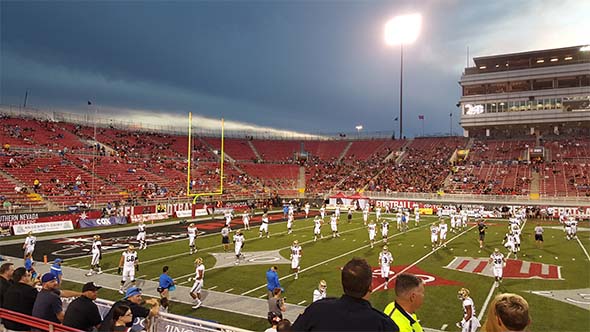
The field at Sam Boyd Stadium has also been redecorated to match UNLV's new uniforms.
Expectations were high for UNLV's 2015 football season after the hiring of National High School Champion Bishop Gorman head coach Tony Sanchez. Sanchez spent the off season trying to rebrand the team with new uniforms (and a new field) that embrace the unique culture and history of the city of Las Vegas. But UNLV would have to survive a brutal non-conference schedule that included a nationally-ranked opponent.
Sanchez's team looked promising in the first half of its opening game, as they got off to a 17-3 lead in the second quarter against Northern Illinois. They also got off strong against 13th-ranked UCLA, holding them to only 10 points up until almost halftime. Unfortunately, the Rebels lost both those games due to second-half collapses, and they began to look like the same ol' Rebels. In fact, in the UCLA game, UNLV's starting quarterback, Blake Decker, left the game with an injury in the first half, and the offense wasn't able to do anything under the command of backup quarterback Kurt Palandech. UNLV also faltered against MIchigan, against whom the offense was only able to score a single touchdown. However, in all of these games, UNLV was far more competitive than they were expected to be. The defense played surprisingly well in all three games, but was worn down by their overpowered opponents and the inability of UNLV's offense to move the ball.
So I had no clue what to expect going into UNLV's home game against FCS opponent Idaho State this past weekend. I've witnessed some embarrassing defeats at the hands of FCS teams in year's past, and it was really hard to tell if UNLV's offense was completely incompetent, or if the teams that they played against in their first three games were just that much better. Hopefully, UNLV would be able to score against Idaho State. And score they did!
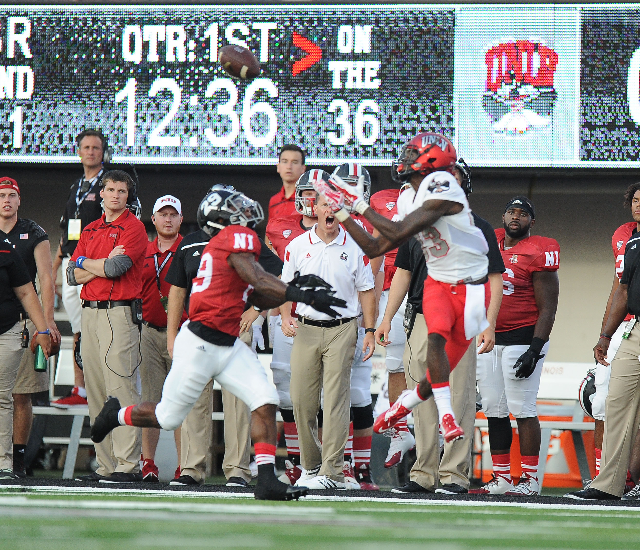
UNLV got off to a hot, 17-3 start in the opener against Northern Illinois, but the offense had floundered since.
After quickly turning the opening possession into seven points due to a blown coverage by Idaho State, UNLV's offense failed to do anything in its next couple drives. In the meantime, Idaho State put together some pretty impressive passes to wide open receivers, but was unable to score. The game blew wide open midway through the first quarter though, when UNLV blocked an Idaho State field goal and turned it into another touchdown. After that, UNLV ran away with the game, ending the first quarter with 35 points and going into halftime with a 52-8 lead. UNLV would go on to win the game by a score of 80 to 8, setting school records for most points scored in a quarter, most points scored in a half, and most points scored in a game. The previous school record was 72 points in a game. UNLV's 80-point night also sets a Mountain West Conference scoring record, beating Air Force's previous record, which was also 72.
I've certainly never seen such a dominating performance by UNLV, and it really blew me away. Maybe Sanchez really is turning the program around... [More]
I have really missed Stephen Colbert while he's been off the air. It certainly didn't help that John Stewart also recently retired from his stint, leaving me without the Daily Show as well. So without any humorous political punditry, I've been stuck having to get all my news regarding politics from - ugh - the news. But fortunately, Stephen Colbert is back on the air after taking over the Late Show from David Letterman earlier this month.

Stephen Colbert introduces the newly-renovated Ed Sullivan Theater.
I was actually really surprised at just how similar the first episode of the Late Show felt to the Colbert Report, right down to the audience chanting "Stephen, Stephen" to open the show. After the opening monologue, one could easily confuse the show for an episode of the Comedy Central series that preceded it, only with a cooler color palette and jazzier soundtrack (thanks to Jon Batiste and Stay Human being the on-stage band). Stephen even put himself back into character as a narcissistic ego-maniac. This was possibly an attempt to pander to his old audience, or at least to ease them into the new show.
Fortunately, he's toned down the narcissism (while retaining his charming confidence) in the past couple week's worth of shows. I'm glad he did too. It worked very well on the Colbert Report as part of an obviously satirical, over the top character. It doesn't work so well in a non-satirical talk show, and might even have been off-putting to viewers who weren't familiar with Colbert's old character.
But hammed-up, satirical personality flaws aside, much of the structure of the Late Show in these first few weeks has been more similar to Comedy Central's Colbert Report than to CBS' Late Show with David Letterman. It's broken up into clearly-delineated segments (some even coming with their own title and intro graphics), the joke delivery is very similar, and the preferred subject matter so far has been politics (along with plenty of digs at the NFL), and there's plenty of clip montages from CNN and Fox News. In his first three weeks, he's already hosted political figures such as Jeb Bush, Joe Biden, Bernie Sanders, Ted Cruz, and Donald Trump. Familiar segments from the Colbert Report, such as "Threat Down" or "The Word" wouldn't feel very out of place at all, and I wouldn't be surprised if they do return in some form (assuming that Comedy Central doesn't have some kind of trademark on them). Viewers expecting Colbert to read off Top 10 Lists and judge stupid pet tricks might be disappointed, but viewers of The Colbert Report should be getting more or less what they expect.

Politics still seems to be Colbert's favored topic. We'll see if that holds up after the election is over -
or at least once Donald Trump is out of it.
But even though Stephen is back behind a desk in front of a camera, and he's making roughly the same jokes, on roughly the same subject matter, with roughly the same delivery, it still just isn't the same... [More]
9ffe61ae-3b70-4ae0-aace-9f521c956008|0|.0
Tags:The Late Show, Stephen Colbert, CBS, Jon Batiste, Stay Human, Ed Sullivan Theather, David Letterman, the Colbert Report, Comedy Central, narcissism, Super PAC, donors choose

One of the most glaring problems with Madden for many years now has been the passivity of offensive receivers. They've been completely unwilling to make any effort to track the ball in the air and go up and get it. Often, underthrown balls would be easily intercepted because receivers would mindlessly run their route and never make an effort to come back towards the ball to catch it. This, combined with defensive backs who always had eyes in the backs of their heads, lead to a lot of interceptions and a very frustrating experience in the passing game. This year's Madden finally makes some effort to address this problem, and I honestly thought that this might finally be the year in which things started to really come together for this series. I wasn't expecting Madden 16 to suddenly be the NFL 2k5 of our generation, but I was at least expecting to see a product that felt more complete, in which all the areas of on-field action seemed - at the very least - to be competent.
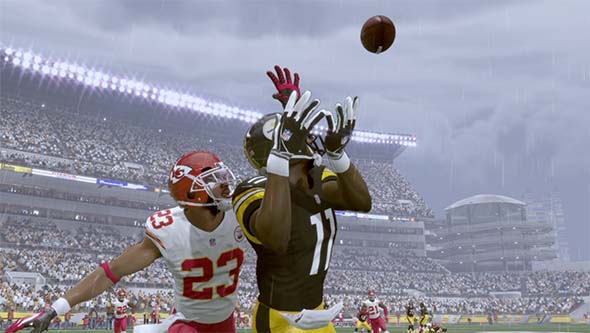
Long-standing problems with passing, catching, and pass defense were points of emphasis this year.
But as the summer went on, and all I ever heard about was some silly new "Draft Champions" mode that sounded like a half-assed fantasy football season, I really started to lose any hope and excitement that I had. Normally, I'd buy Madden used in order to keep my money out of EA's greedy hands. Fortunately for EA, the first two stores that I went to were sold out of Until Dawn, so I decided to go ahead and splurg on Madden so that I'd have something to do that weekend.
The mandatory tutorial featuring a hypothetical Super Bowl 50 rematch between the Steelers and Cardinals is an absolute train wreck. A handful of players recorded unbelievably cheesy dialogue for this sequence that seemed to imply that this year's Madden was going to put some emphasis on the personalities of the players and include some smack talk (the kind of thing that Madden '05's "Storylines" feature was going for). I thought it was weird that I hadn't heard anything about this in any of the promotional material or previews. It seemed uncharacteristic for Madden and contradictory to the NFL's careful regulation of the public image of the league.
The tutorial proceeded to force me through a series of intolerably-scripted plays and highlights of its fictitious Super Bowl in an attempt to clumsily introduce me to its new passing and catching mechanics. This tutorial is ugly to watch, painful to listen to, is terrible at teaching the new mechanics, and is blatantly unrepresentative of the actual game content.
I hadn't even finished the tutorial or made it to the game's main menu yet, and I was already suffering buyer's remorse.
Table of Contents
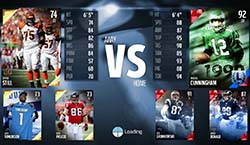
Historic players can be drafted.
Ultimate Team fantasy draft
My feelings of buyer's remorse only grew as I looked through the new features and menu options.
There seems to be a bigger and bigger push towards Madden being an elaborately-crafted system of fantasy football. I already thought that Ultimate Team was trending painfully in that direction. As silly as I think that feature is, Madden players seem to love it - so much so that EA has decided to add another fantasy football-inspired game mode: Draft Champions. As always, all EA's efforts seem to be in trying to make Madden as "game-y" as possible instead of making any efforts to emulate the deeper strategy and nuance of real football. Ultimate Team, and now Draft Champions, are the ultimate expression of that.
Draft Champions is a modified 15-round fantasy draft in which you select from one of three available players in each round. You start by selecting a coach, which grants you a specific offensive and defensive play style for you team, and so you want to try to get players that best fit into those schemes - if you're lucky enough to be offered any. In the final round, you also get to chose one of three Hall of Fame historical players, such as Randall Cunningham or Rod Woodson. Once the draft is done, you play a sudden-death "season" of three games. One loss, and you're done.
I complained about the rushed pacing of games in Madden 15, but the "games" in Draft Champions are only half that time! Three minutes in a quarter is not enough time to play football at all. The game even taunts you by forcing you to have to chose a coach and team style in the first round, and you'd have to be masochistic to chose anything other than "long pass" or "medium pass". Chosing "ground and pound" was barely viable with six minute quarter; it's virtually pointless with three minute quarters. A twelve minute game isn't long enough to establish any kind of "pounding" running game. All you have to do is listen to the commentary to hear how screwed up such a fast game is. Every game, the commentators talk about how it's been a "defensive battle" going into the two-minute warning or halftime - because one team had the ball for the entire half! It's nonsense!
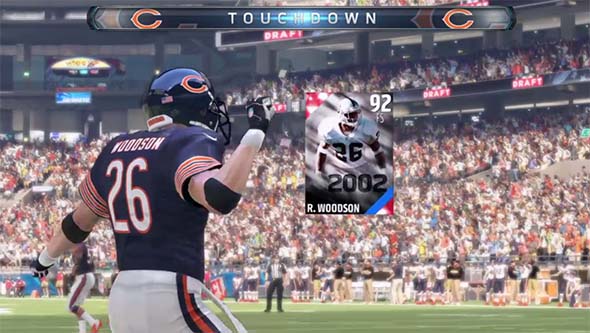
Draft Champions might be more worthwhile if you got to keep some of the players you drafted and add them to MUT.
I'll grant this to the game: the second two Draft Champion games are very tense. The short time time frame and insta-death nature of the mode means you have to play virtually perfectly. Of course, that's to be expected when you start the game in a four-minute drill.
And what do you get for your effort? What reward is worth this idiotic waste of time? You get some PSN trohies / XBox Live achievements, and some packs of Ultimate Team cards (most of which are just redeemable for points to buy other cards). You don't even get to keep the cards that you drafted in Champions mode - just random packs. Eventually, after you beat Draft Champions enough times, you get some elite MUT cards. Oooh... [hand waving] Why is Draft Champions even its own mode on the main menu? Why isn't it just an option in the MUT menu? It's basically just a fantasy draft and preseason for MUT, but you don't even get to keep the players! So what's the point?!
The question that I'm left with is: has Madden jumped the shark? Is this the point where I have to just give up on the idea that EA will ever want to pull Madden back to its simulation football roots? Has it so completely diverged from what I expect from an NFL-licensed football game that I just can't take it seriously anymore as an NFL-licensed football game? I'm tempted to just not even bother with the rest of this review if this is the kind of trash that EA is going to waste their time with. If EA thinks that this is the way of the future for football gaming, then I want no part of it.
But, for old times sake, I guess I can go over the actual football parts of the game, give it at least one more stab at being taken seriously, so click here to read the rest of the review... [More]
ac360be0-195e-4576-8ce9-1ac4ad0f6895|2|5.0
Tags:Madden NFL 16, Madden NFL, EA, EA Sports, Tiburon, sports, football, NFL, simulation, Ignite Engine, draft champions, ultimate team, fantasy football, connected careers, franchise, skills trainer, receivers, catching, passing, defensive back, preseason, PS4, Odell Beckham Jr.
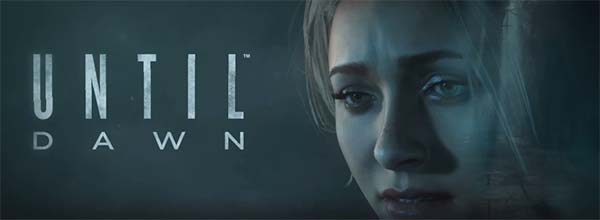
Here is a game that somehow managed to slip under the radar for me. As a snob for strong narrative-based games, I was surprised that a project like Until Dawn managed to escape my attention until a couple weeks prior to its release. Once I heard about it though, I was immediately intrigued. I knew it wasn't going to be a proper survival horror game, but it looked to have a lot of potential to move the horror genre (and gaming in general) in interesting directions. I was doubly surprised when I went to go by the game a couple days after its release so that I could play it over the weekend, only for it to be sold out in the two stores that I went to. It's the first time in about ten years that I've had trouble finding a game on store shelves within a week of its release, but I doubt that I'll have to break my long-standing boycott for pre-orders. So I had to resort to ordering it off of Amazon Prime with 2-day delivery and play it the next weekend.
Suspend your disbelief - and your common sense
Don't be fooled into thinking that Until Dawn is something other than what it is. It is an interactive movie with branching story. It is not an open-ended survival game! Anyone familiar with Heavy Rain or the Telltale Games will have a good idea of how the game will play out. The things you do and the actions and dialogue available are very tightly scripted. You won't be making decisions on how the group splits up, who goes where, or even what any individual character might be doing at any given time. Large chunks of the game are just dialogue and cutscenes, stopping you every now and then to let you make one of two choices, or showing a button prompt on screen to keep the action going (and sometimes keep the character alive). There are even some action sequences that could have been playable, but which are strictly non-interactive cutscenes.

How about lighting some friggin' candles instead of groping around in the dark?
The only time that the game opens up more is when you must explore rooms for clues or evidence. In these cases, you have complete control of character movement and can walk around mostly freely. But interactions are severely limited. You can only interact with the select few objects that the developers intended for you to interact with.
These limitations can be very frustrating because the game doesn't let you do some obvious, common sense things. Upon entering the lodge, I'd like to have been able to light the candles instead of having to wander around in the dark for the next few chapters. Later, when investigating something crashing through a window, I'd like to have been able to take the rifle I just found on the wall. And even later, after the rifle didn't have enough bullets to shoot the murderer, it would be nice to have been able to open up the revolver I just found to make sure that it's loaded and find out how many bullets are in the chamber. And the list of dumb oversights goes on...
Common sense precautions like taking a melee weapon or checking that your new gun is loaded are not possible.
These limitations are further exacerbated by the esoteric nature of some of the decisions. Since all decision are binary (usually consisting of a "helpful" / "safe" option or an "antagonistic" / "risky" option), it's often unclear exactly what the character will do, and the outcome often plays out in a non-interactive cutscene. The character may not say or do exactly what the option described, which might lead the player to think "that's not what I meant to do / say!", and sometimes a decision might railroad you into following through in a way that you don't want to.
Granted, the options need to be somewhat vague, and the consequences shouldn't be obvious. That would make the game too easy and dull. The game has to utilize some of the classic horror movie tropes in order for the narrative to work. After all, the characters don't have the foresight to know that they're in a horror movie game. I accept that there needs to be limitations on the precautions that the player can take, but the player also needs to feel like they have more agency. [More]
1eebd3c1-dc0a-4bc2-9d50-ae593ac587ec|4|2.8
Tags:Until Dawn, Supermassive Games, PlayStation, PS4, PSN, Sony, exclusive, horror, cabin, slasher, saw, consequences, narrative, drama, pre-order, Hayden Panettiere, Peter Stormare, Brett Dalton, Rami Malek, Galadriel Stineman, Noah Fleiss, Jordan Fisher, Nichole Bloom, Meaghan Martin, Ella Lentini
|

| 12 | | | | | | | 60 | | 11 | | | | | | | 55 | | 10 | | | | | | | 50 | | 09 | | | | | | | 45 | | 08 | | | | | | | 40 | | 07 | | | | | | | 35 | | 06 | | | | | | | 30 | | 05 | | | | | | | 25 | | 04 | | | | | | | 20 | | 03 | | | | | | | 15 | | 02 | | | | | | | 10 | | 01 | | | | | | | 05 |
|